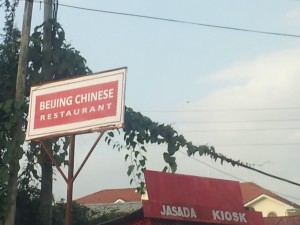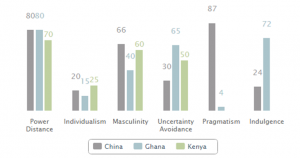Chinese investments in Africa have been gaining pace since the turn of the century. And Chinese people have immigrated onto the continent along with their investments. That much we knew.
What I didn’t know is that Africans are also migrating to China, according to articles in The Africa Report. One of them, called “People are at the heart of China-Africa engagement”, led me to ask: how do the Chinese and Africans mix?

Mingling of Chinese and African people in a business context is anything but easy (see related post on the Chinese presence in Africa). According to my (Chinese and African) interviewees in Ghana and Kenya, cultural differences are huge. To name a few – at the risk of over generalization:
- The Chinese go to Africa ready to work 6.5 days/week; Africans want to dedicate time to other pursuits (e.g., family life, religious practices);
- The Chinese stick to deadlines strictly; Africans may not;
- The Chinese focus on profit-making at the expense of overall development; Africans have a broad perspective; they are interested in the socioeconomic development of their community.
How did these differences evolve? Where do they come from? To find out I went to an expert source: The Hofstede center. It scores countries on a number of cultural dimensions (meanings below graph). Take a look at the scores for China, Ghana, and Kenya:

Meanings of the cultural dimensions:
- Power distance: the extent to which the less powerful members of institutions and organizations within a country expect and accept that power is distributed unequally;
- Individualism: the degree of interdependence a society maintains among its members;
- Masculinity: the extent to which a society is driven by competition, achievement and success, with success being defined by the winner / best in field;
- Uncertainty avoidance: The extent to which the members of a culture feel threatened by ambiguous or unknown situations and have created beliefs and institutions that try to avoid these;
- Pragmatism: extent to which a society adapts its past traditions to deal with the challenges of the present and future;
- Indulgence: the extent to which people try to control their desires and impulses (high score = weak control = indulgence; low score = high control = restraint).
The most striking differences are pragmatism and indulgence (unfortunately, not listed for Kenya). These clearly demonstrate the claims made by my interviewees – that the culture gap is vast.
What do you think?


I agree that the cultural differences are huge, but I think the asumptions made are not completely right.
After living 5 years in China and teaching at the CAU and BUA universities business schools and through the collaboration in many different private projects, I’ve got some insights about their working performance and culture, and I disagree that the Chinese stick to the deadlines stricktly.
And being true that Chinese work many hours, their productivity is very low and their ‘indulgence’ at work is considerable.
Thanks for sharing your views, David. The comment about Chinese sticking to deadlines may need to be contextualized: it came from a manager in the public infrastructure construction industry. Deadlines are very immportant to them: if they don’t meet the deadlines, they are penalized. In this context, I guess they make sure their Chinese workers meet the dealine, and that’s easier to do with them than with African workers. In any case, y main point was to compare Chinese and Africans.
Hi Africa,
I couldn’t imagine migration to China from Africa. Very interesting issue. Even with those cultural differences ties between China and Africa are very strong. From an strategic, economic and cultural point of view, I could say that these two continents are very close. China needs African resources to fuel its development goals, markets to sustain its growth and political alliances that support its position on the international scene. At the conference held in Bandung in 1955 for developing countries, China supported the sovereignty of African states and non-interference in their internal affairs. China will continue supporting Africa as Africa supported them in the 70’s to join the United Nations. These are mere examples…………how many more things Africa and China share?
Thank you for you insights, Jose Pedro — very interesting, as usual.
Since the 1950s China has seen Africa as a source of resources, as you indicate. What’s new is that the emerging Chinese MNCs also see some African countries as a market for their products.
With regards the non-interference policy, that’s a double-edge sword: Chinese MNCs don’t pay as much attention as the Western ones to human rights issues. Even if just to comply with their home country regulations, US and European companies are more careful with these matters — and from what I’ve seen, Africans prefer to work for them than for Chinese companies.